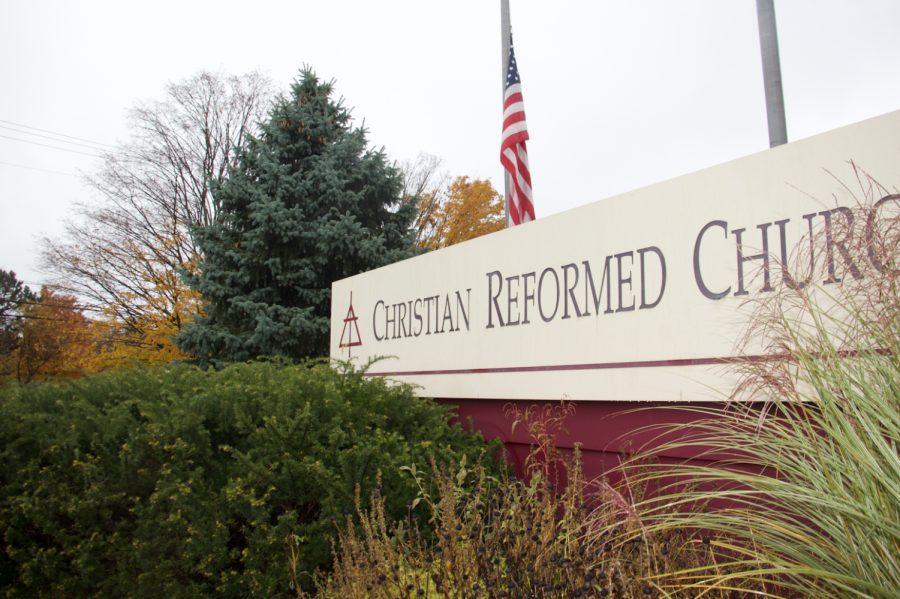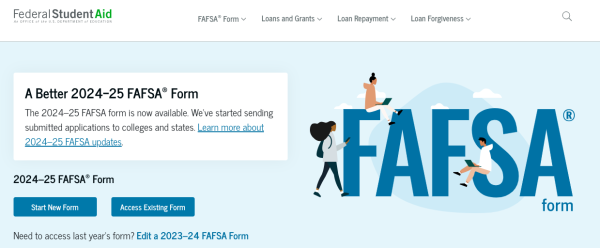BREAKING: Board of trustees vote that faculty no longer required to be CRC, send kids to Christian K-12 schools
Calvin faculty are no longer required to be members of the Christian Reformed Church and to send their children to Christian day schools. Faculty senate voted to approve the change on April 21, and the board of trustees approved this unanimously on May 8.
Faculty are now able to attend “a Calvin University-supporting Protestant congregation” in addition to a CRC congregation or a church in ecclesiastical fellowship with the CRC. This church must be a Protestant congregation that affirms the three creeds of unity (Nicene Creed, Athanasian Creed, and Apostles’ Creed), as well as accept that the faculty member attending there affirms the Reformed confessions (the Heidelberg Catechism, Belgic Confession, and Canons of Dort).
The new policy states that faculty will be expected to articulate an understanding and affirmation of “essential Reformed Christian theological ideas” as part of their tenure and five-year tenure review. Calvin will enter into “strategic partnerships” with the churches that faculty attend, both non-CRC and CRC.
Mirroring the stance of the CRC, Calvin is no longer mandating that faculty send their children to Christian day schools, but is still encouraging them to do so. The report to faculty senate stated that professors applying for tenure will be expected “to articulate a Reformed Christian view of education and to describe how they actively support Christian education.”
Calvin will still provide financial support to faculty who send their children to Christian schools. “We really want to frame Christian education as something we really believe in. It’s invitational. We want you to believe in it too,” Calvin University President Michael Le Roy said.
Talks about changing the policy have been happening on and off for decades, but Le Roy and the cabinet took concepts of the new requirements to the board last October and detailed policy to the board in February. Prior to this switch, faculty were expected to demonstrate membership in a CRC congregation or in a congregation in ecclesiastical fellowship with the CRC (listed here) within a year of teaching at the university.
Le Roy emphasized that the faculty will still be expected to affirm the ecumenical creeds and Reformed confessions. “There’s a lot of consensus [among staff and faculty] that this set of doctrinal parameters or guidelines is something that we all affirm, and nobody wants to mess with that,” Le Roy said.
The CRC will still be responsible for deciding theological issues for Calvin. “I think we’re better when we’re part of a church that has ecclesiastical authority over the university. It gives us rootedness. It provides an external check on doctrinal matters,” Le Roy said.
Le Roy said it’s difficult to predict whether many faculty will leave their current church or have their children transfer from their current school but thinks that it will help Calvin in recruiting new faculty.
This change reflects a broader shift in demographics, not just in the student body but also the faculty, as more come to Calvin unfamiliar with the CRC.
The Day 10 report of 2019 showed that roughly 28.7% of Calvin’s student body are members of the CRC. 39% of this year’s freshman class graduated from a Christian school, whereas 44% of the senior class graduated from a Christian school. Le Roy says this decline is reflective of the decline in baptisms 18 years ago, not the relationship between Calvin and the denomination.
Le Roy said, “The vision is biblically and theologically rooted; it’s not sociologically rooted.”
The CRC still collects ministry shares for Calvin, which amounts to about 2.5% of Calvin’s total budget, according to Le Roy. The university president says that the school remains grateful for the denominational shares. Calvin provides about $17 million in aid to CRC students.









Natsun Eisen '14 • May 16, 2020 at 12:51 am
RE: Anna Jeffries
I don’t think that there was anything inappropriate about Mr. Lubben’s use of this Chimes’ comment section. He expressed an opinion and did so politely. Nowadays, news website comments have become the new letter to the editor section and I think it’s great that Mr. Lubben felt comfortable making use of this space to participate in this conversation. It may have dramatically backfired, but being part of a community involves being willing to hear from each other, even if we disagree.
Actually, I’m glad that Mr. Lubben didn’t use his influence to go through official channels, but instead shared his thoughts here on an equal footing with other commentators.
I’d be thrilled if more members of the Calvin community began to make use of the Chimes’ comment sections. We should be talking about what the Calvin of the future could be and Chimes is an excellent platform on which to do so.
Anna Jeffries • May 14, 2020 at 10:55 pm
Mr. Lubben
As the Chair of the Board of Trustees, I find your conduct both unprofessional and inappropriate. I would expect more from you than to publically demean the student newspaper—a good faith organisation of Calvin University with dedicated and earnest students who are proud of the important role they play—and to do so in the “comments” section of the student newspaper’s website. Since you clearly had an issue with the way this article was written, you should have contacted the student newspaper through the proper channels in order to facilitate a constructive and mature conversation. You could have even written in a letter, like so many Chimes representatives have to ask that you issue an apology for such behaviour.
What were you hoping to accomplish by attacking this article? The student newspaper is journalism conducted by students for their peers, not for the Chair of the Board of Trustees—wanting to “spin” journalism a certain way de facto prevents such news from being honest and objective journalism. I’ve never met you, sir, but I’m frankly embarrassed that the Chair of such a board would so erroneously breach proper conduct.
Daniel J Meeter • May 14, 2020 at 7:04 am
Also, that’s not why Calvin was established. It was established to supply Christian Reformed ministers. The “square inch” had never been heard of.
Daniel Meeter, ’76, Chimes ’75-’76.
John A. Tamming • May 12, 2020 at 9:45 am
I have had a similar exchange with the editor of The Banner, which all too often just parrots whatever headquarters passes on through press releases or their equivalents.
Bethany nailed it.
As a former Chimes person, keep going!
And Mr. Lubben, please indulge us as to exactly what about the headline was false and set your hair on fire.
Best to all – John A. Tamming
Philip Christman • May 11, 2020 at 8:30 pm
In this thread, a powerful Calvin stakeholder—in this case the chair of the BOT—has reacted to a harmless Chimes piece with bizarrely disproportionate anger. It’s good to see tradition upheld!
Natsun Eisen '14 • May 11, 2020 at 5:53 pm
I agree with Bethany. After comparing the article with Mr. Lubben’s comment, the best I can tell is that the article is accurate, but Mr. Lubben just doesn’t like the way it sounds.
He seems to feel that if the change in requirements is explained in just the right way, it’ll sound like something other than a historical change in institutional policy. This provides an explanation for his very wordy comment, but it doesn’t seem to change the actual facts of the decision, which the Chimes appears to have accurately reported.
Bethany • May 11, 2020 at 12:49 pm
I’m grateful to Chimes for doing journalistic work with integrity. To suggest that Chimes “missed the headline” is a misunderstanding of the role of student journalism. Chimes doesn’t exist as a platform to justify all the decisions of Calvin and the Board of Trustees; that is the job of the Calvin communications team (and they do it well). Chimes reports news that is relevant especially to the student body. Nothing in this article appears factually incorrect; it even emphasizes Calvin’s ties to the CRC and quotes President LeRoy’s perspective on the matter. It’s difficult to do an honest read of the article and somehow think Calvin’s commitment to the CRC and Reformed theology has lessened. The fact remains that this is exciting news (certianly headline-worthy) for many students and alumni who have long seen the strict rules around denomination and school choice for kids as one impediment to hiring more diverse faculty. Chimes is valuable because it’s not their job to make Calvin look good. It’s their job to truthfully report on stories, which they did.
Craig Lubben • May 9, 2020 at 2:03 pm
I serve as the Chair of the Calvin University Board of Trustees. I am disappointed that Chimes would publish a headline that so seriously misconstrues the actions take by the Board. That headline is a disservice to Calvin, the Christian Reformed Church and to the Board of Trustees.
First, the Board is appointed by the Christian Reformed Church and is completely committed to assuring that Calvin meets the mission that the CRC established for it.
Second, the Board approved changes to the Faculty Handbook that will strengthen the relationship between Calvin and the CRC by assuring that Calvin is continuously improving in meeting its mission. Calvin was established to assure that Lordship of Jesus Christ is celebrated and explored in every square inch of Creation. The Global Faculty Development Institute will train every faculty member to think deeply about and help them implement the best practices for integration of faith and learning from the Reformed perspective. No other Christian College has a resource like this Institute. It will assure that Calvin remains a leader in providing the finest Reformed Christian education. That should have been the headline and Chimes missed it.
Third, the church membership requirements have always encouraged Calvin faculty to attend a CRC church while at the same time allowing them to attend a church in ecclesiastical fellowship with the CRC. The revised faculty requirements still encourage Calvin faculty to attend a CRC church while at the same time recognizing that there are other churches that share the CRC’s commitment to the Reformed Confessions even if not in formal ecclesiastical fellowship with the CRC. While this expands the options of churches available to Calvin faculty, it is not the monumental shift suggested by the headline.
Finally, regarding Christian education, the faculty handbook requires a Calvin faculty member to “articulate a Reformed Christian view of education and describe how one actively supports Christian education.” This is consistent with Article 71 of the Church Order of CRC. To describe this commitment to demonstrate active support of Christian education as meaning that faculty are no longer required to send kids to Christian K-12 schools seriously misstates the intent and language of the requirement.
Timothy Ellens • May 9, 2020 at 11:04 am
This decision has been made with a vision for deepening and strengthening our Reformed Christian witness. You can read more of the rational at https://calvin.edu/news/archive/calvin-deepens-and-strengthens-faith-expectations.